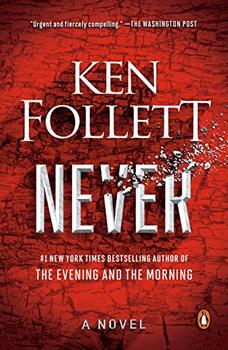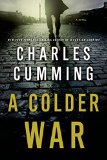Summary | Excerpt | Reviews | Beyond the book | Read-Alikes | Genres & Themes | Author Bio

Gerald Seymour's latest novel, The Walking Dead, is
reminiscent of a patchwork quilt. At first, you start with many dissimilar items
arrayed before you, with no idea how these unrelated bits can possibly be sewn
together into a final product. Eventually, however, after much time and effort and connecting this piece to that, you end up with a gratifying result. The "pieces" in The Walking Dead are the array of seemingly unrelated characters and plot lines that Seymour ultimately crafts into a satisfying thriller.
The book's action takes place over 17 days, with each of the chapters
corresponding to a single day. The plot touches on what each of the principals
is doing during that time period. At first this is somewhat frustrating, as the
reader gets just a brief glimpse of one character before moving on to another -
a bit like trying to watch TV while someone's flipping through the channels.
Although Seymour does an admirable job of keeping the reader on track given the
huge number of characters presented in the book's early chapters, it's still a
challenge to keep them straight. There are several who show up for two pages of
narrative before disappearing for the next ninety. Fortunately, as the story
lines merge and the connections become more obvious, the style becomes less
hyperactive and the story becomes more coherent.
One of Seymour's strengths is his ability to create marvelously detailed
three-dimensional characters. While sometimes stereotypical, they are still
interesting enough to keep the reader engaged. The book's weakness, however, is
Seymour's apparent need to provide every single one of these characters with an
extensive back story, whether or not that person's eventual role is important.
The book doesn't exactly bog down as a result, but at its conclusion the
reader may experience some irritation at having spent so much time on people and
incidents that in the end are completely irrelevant to the main plot. Going back
to the quilting analogy, it's as if care and attention were spent sewing
together several complex pieces that were then simply discarded.
In the hands of a lesser writer, The Walking Dead could have become a
run-of-the-mill pot-boiler. What makes this novel noteworthy is Seymour's
attention to the book's underlying themes. He delves into the question of how
young men get into situations where they willingly risk their lives for their
ideals, drawing parallels between the suicide bomber and a young volunteer fighting in the Spanish Civil War seventy years earlier (1936 - 1939). Other sub-texts explored are the efficacy of intelligence gathering and old-fashioned detective work, and the roles chance and coincidence play in
events.
The book is well paced, starting slowly and gradually picking up speed before
barreling through to the end. Parts of the story are predictable, but some of
the plot twists are truly shocking. Readers are advised to have a contiguous
block of time available for the last third of the novel; once started, it's
difficult to put down. There are those who may be put off by the disturbing
nature of a few scenes, but most readers will enjoy this addition to the genre.
About the Author: Gerald Seymour was one of the UK's premier television news reporters. He was an eyewitness, up close and on the ground, to some of the epoch changing events of the last decades. Among them, he was on the streets of Londonderry on Bloody Sunday when paratroops clashed with Irish demonstrators. He was at the Munich Olympics and saw the agony of Israeli athletes held hostage by Palestinian gunmen and then the catastrophic failure of the German police to save them. He was in Rome in the cruel days when the Red Brigade captured Aldo Moro, a veteran politician, then savagely murdered him. His first novel, Harry's Game, was an instant bestseller and immediately established Seymour as one of the most cutting-edge and incisive thriller writers in the UK and around the world. Since then, his extraordinary blend of breathtaking storytelling and current events prescience have held his many readers in his spell.
![]() This review
first ran in the July 11, 2008
issue of BookBrowse Recommends.
This review
first ran in the July 11, 2008
issue of BookBrowse Recommends.

If you liked The Walking Dead, try these:

by Ken Follett
Published 2022
The new must-read epic from master storyteller Ken Follett: more than a thriller, it's an action-packed, globe-spanning drama set in the present day.

by Charles Cumming
Published 2015
Cumming returns with MI6 agent Tom Kell (A Foreign Country), in a tour de force that will dazzle readers and critics alike.
Your guide toexceptional books
BookBrowse seeks out and recommends the best in contemporary fiction and nonfiction—books that not only engage and entertain but also deepen our understanding of ourselves and the world around us.